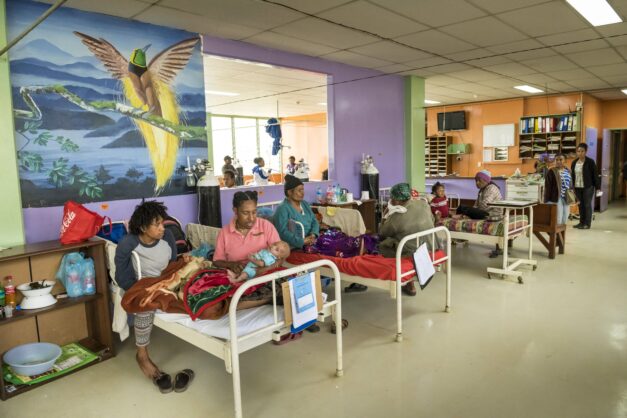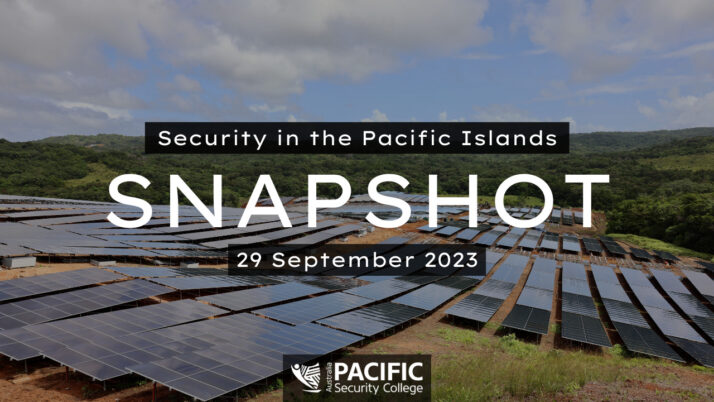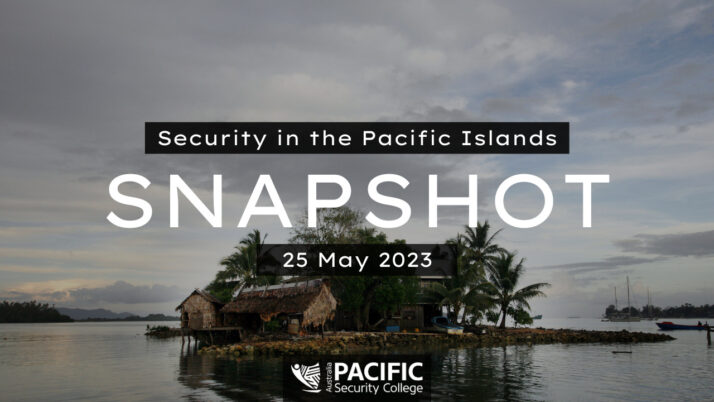COVID-19 Pandemic in the Pacific Islands Region – First Anniversary

Marc Dozier / AFP
Meg Keen and Hugh McClure
One year on from the first case in the Pacific, there have been successes and setbacks, but to stop the spread of COVID-19 the region doesn’t just need vaccines – it needs support for public education and services for health security now and in the future, Meg Keen and Hugh McClure write.
Twelve months ago this week, the first COVID-19 case hit the Pacific island countries. In the last fortnight with the spike of cases in Papua New Guinea (PNG) that year of experience has been overshadowed, but it holds hope and lessons that should not be lost.
A year on, the situation in PNG is most concerning. Known case numbers in the country are doubling every week. With just 50,000 tests conducted in a country of nine million people, it was guaranteed that the true spread was far greater — recent statistics confirmed there was more COVID-19 in the community than officially recorded.
Daily cases, that is the few being detected through the sparse medical system, are pushing close to 200 and rising. Overrun with cases and increasing infections among health workers, governments are scrambling to get medical supplies in quickly and open more health facilities. 8,000 vaccines will arrive shortly which will cover the very few health care workers, and another 288,000 are on the way in the next few weeks for other essential workers.
The Australian Government has requested that European authorities divert one million doses of Australia’s contracted vaccine supplies to PNG. Still the population is nearly nine million, and mostly rural and remote.
Although a surge in personnel, supplies and vaccines are flowing into the country, and the PNG Prime Minister is starting to take stronger action, the challenge in this diverse country will be to match supplies, with services and community education.
Elsewhere in the Pacific, there is hope. Impressively, the Pacific accounts for eight of the world’s 10 countries which are yet to record a single case of the virus. The elite club includes: Cook Islands, Federated States of Micronesia (FSM), Kiribati, Nauru, Niue, Palau, Tonga, and Tuvalu.
Through 2020, most known cases were confined to a few externally-governed territories, namely French Polynesia, Guam, and the Indonesian-controlled West Papua provinces where borders are not tightly shut.
Border closures, lockdowns and curfews have kept community transmission minimal. Fiji has gone 11 months now without a case outside border quarantine, while Vanuatu and Solomon Islands have detected and quarantined all cases at the border.
Reflecting on the importance of border closures, a senior Samoan health official stated: “You just need to look at what has happened in big countries like America… these are countries with advanced health systems, and still, they’re suffering.” Pacific governments knew that the best approach to protect citizens given their stretched health services was to ensure it never arrived.
Economies continue to be hit hard. Across the Pacific, gross domestic product (GDP) tumbled by 6.1 per cent in 2020. The tourism sector is in free-fall: in 2020 tourist-dependent Fiji saw a 19.8 per cent decline in GDP. Economic growth will not recover until vaccines have been administered and borders reopened, and, even then, the economic rebound could take years.
Governments have responded with tentative efforts at social protection, and large stimulus packages, including in Samoa and Tonga. Even so, business confidence is low and recovery slow. In Solomon Islands, the 12-month business outlook remains bleak: two-thirds of businesses do not expect any improvement. Most businesses have laid off staff this year.
The pandemic magnifies Pacific vulnerabilities, most evident when Cyclone Harold added to Pacific woes. In Fiji alone over 180,000 had their homes and livelihoods affected. The Pacific Humanitarian Corridor facilitated regional action to supply much needed medicines and food during the dual crisis — laying a foundation for strengthened regional responsiveness.
Civil-government partnerships are key to resilience — getting that partnership right matters. There has been some heavy-handedness. The pandemic marks the first time State of Emergency declarations have been invoked as a proactive, rather than reactive, measure, granting governments wide-ranging powers.
In Honiara, an early decree sent the unemployed back to their villages, while in PNG, transparency watchers questioned whether good governance was at threat from reduced oversight during State of Emergency periods — a cautionary tale for the next phase of the fight against COVID.
Out of adversity there are also gains. New partnerships and more inclusive arrangements are evolving among governments, multilateral agencies and non-government organisations (NGOs). We all hear about multilateral and donor interventions in the news, but there are also homegrown wins. The Fijian Council for Social Services – an NGO umbrella body – is working collaboratively with government to ensure the needs of marginalised groups were better assessed and addressed.
Women’s and church groups leveraged financial and material resources to quickly respond to local needs. Overall, stronger national links to local leadership that can coordinate emergency responses is a welcome advance; there will be ‘no turning back’ on greater Pacific agency.
The roll-out of vaccines will be complex given weak health systems, and patchy critical infrastructure to transport and store vaccines. COVID-19 vaccination programs have begun, particularly in Micronesia through the United States’ Operation Warp Speed, Fiji received the region’s first COVAX shipment last week, and PNG will receive a huge surge in vaccines.
The key will be to maintain vigilance and ensure that getting supplies into the Pacific Islands in the short run doesn’t neglect supporting health systems and personnel to get the job done now, and in the long run.
More Stories

Security Snapshot - 29 Sep 2023
Pacific Security Snapshot | 29 September 2023
The security stories shaping the region ➣ 2nd United States-Pacific Islands Forum Summit ➣ Niue and Cook Islands forge diplomatic ties with United States ➣ Chinese navy vessel arrives in Papua New Guinea ➣ Pacific climate change advocacy at the United Nations ➣ El Niño is officially declared ➣ Fifteenth Pacific Health Ministers Meeting in…

Security Snapshot - 26 May 2023
Pacific Security Snapshot | 25 May 2023
The security stories shaping the region ➣ Papua New Guinea and the United States sign Defence Cooperation Agreement ➣ United States-Pacific Islands Forum Dialogue held in Port Moresby ➣ Pacific leaders meet Indian Prime Minister Narendra Modi ➣ Pacific call for climate finance breakthrough at UN session ➣ Tuvalu strengthens efforts against illegal, unreported and…






